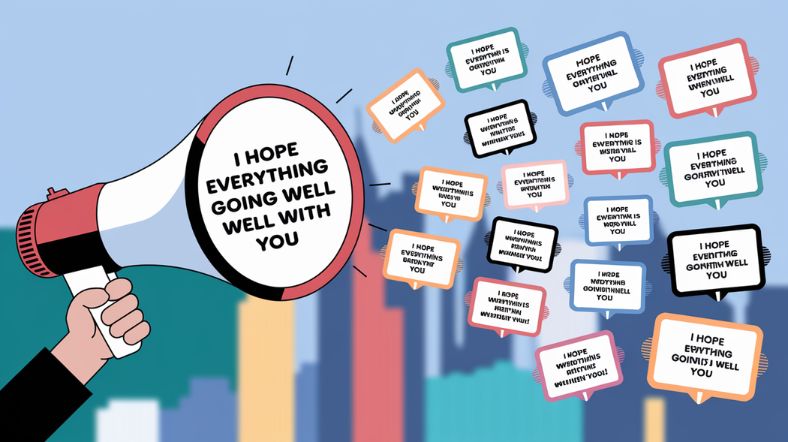Sometimes, the simple phrase “I hope everything is going well with you” can feel a bit too standard or overused.
Whether you’re looking to add a bit of variety to your emails, text messages, or casual conversations, there are plenty of fresh, thoughtful alternatives that can express care, positivity, and professionalism.
In this article, we’ll explore 21 alternative ways to check in on someone’s well-being, helping you communicate with more nuance and warmth.
“I Trust You’re Doing Well”
Meaning and Context: This phrase suggests confidence in the person’s well-being. It’s polite and professional, suitable for emails, formal letters, or business communications.
Example: “I trust you’re doing well as you prepare for the upcoming project deadline.”
Impact: By using this phrase, you convey respect and professionalism while expressing care.
“I Hope This Message Finds You Well”
Meaning and Context: This formal and polite expression is often used in written correspondence, especially in business emails. It conveys well-wishes with an element of personal touch.
Example: “I hope this message finds you well and in good spirits.”
Impact: It adds a level of sophistication to your communication, showing that you care about the recipient’s state of being.
“I Hope You’re Having a Great Week”
Meaning and Context: A warm, casual expression perfect for mid-week check-ins or informal conversations. It’s upbeat and shows that you’re interested in their current moment.
Example: “I hope you’re having a great week! Let’s catch up soon.”
Impact: This creates a friendly, approachable tone that fosters connection and positivity.
“Hope Everything Goes Well Message”
A message like “I hope everything goes well” is a simple, caring expression used to wish someone well in their endeavors or daily life. It shows empathy and positive intentions, creating a sense of support and encouragement.
Example: “I hope everything goes well with your interview tomorrow!”
Impact: It demonstrates thoughtful concern and fosters a positive connection, making the recipient feel valued and supported.
“I Trust All Is Well on Your End”
Meaning and Context: This phrase has a slightly more informal yet professional touch, appropriate for both emails and casual conversations with colleagues.
Example: “I trust all is well on your end and that the project is progressing smoothly.”
Impact: It implies that you trust the recipient to be handling things well, which is a sign of respect and confidence.
“Hope Everything is Well with You”
The phrase “I hope everything is well with you” expresses genuine care for someone’s overall well-being. It’s a friendly way to check in, showing empathy and concern.
Example: “I hope everything is well with you and that you’re enjoying your new role!”
Impact: This message fosters a sense of connection and warmth, making the recipient feel appreciated and thought of.
“I Hope You’re Doing Fantastic”
Meaning and Context: A more enthusiastic and positive alternative. It’s best suited for informal settings, such as with friends, family, or casual colleagues.
Example: “I hope you’re doing fantastic and enjoying your new role!”
Impact: It adds an element of excitement and positivity, making the conversation feel more engaging and upbeat.
“I Hope Things Are Going Smoothly for You”
Meaning and Context: This phrase implies that you’re hoping everything in their life or work is flowing easily and without complications.
Example: “I hope things are going smoothly for you as you wrap up the final stages of the project.”
Impact: It shows empathy for the recipient’s situation, acknowledging that challenges can arise, but you’re hopeful for their ease.
“Hope Everything is Well”
The phrase “I hope everything is well” is a simple and neutral way to express good wishes for someone’s general well-being. It’s commonly used in both personal and professional contexts to show thoughtfulness.
Example: “I hope everything is well with you and your family.”
Impact: This message conveys genuine concern, creating a positive, reassuring tone in the conversation, and strengthening the relationship.
“I Trust You’re Enjoying a Productive Week”
Meaning and Context: Ideal for colleagues or business partners, this expression conveys well wishes while focusing on work or productivity.
Example: “I trust you’re enjoying a productive week and making great progress on your tasks.”
Impact: This phrase promotes a sense of accomplishment and encouragement, especially in professional settings.
“I Hope Everything Is Going Well on Your Side”
Meaning and Context: More casual than formal, this phrase is perfect for personal conversations or informal professional emails.
Example: “I hope everything is going well on your side of things. Let’s connect soon!”
Impact: It keeps things light and conversational while still showing genuine interest in the other person’s life.
“I Hope All Is Well”
Meaning and Context: A straightforward and versatile alternative that can be used in both formal and informal communication.
Example: “I hope all is well with you and your family.”
Impact: It’s simple, neutral, and direct, ensuring that you communicate care without being overly familiar.
“I Trust You’re Keeping Busy in the Best Way”
Meaning and Context: A positive and slightly playful alternative, suitable for casual professional exchanges or friendly check-ins.
Example: “I trust you’re keeping busy in the best way possible and staying energized!”
Impact: This phrase acknowledges the recipient’s workload while emphasizing positivity, making it a lighthearted way to connect.
“I Hope Everything Is Coming Together for You”
Meaning and Context: Ideal for situations where someone is working on something big or complex, this phrase expresses hope that all elements of their life or project are aligning.
Example: “I hope everything is coming together for you with the event planning!”
Impact: It shows support and encourages the other person to keep going, acknowledging their efforts.
“I Hope You’re Feeling Great”
Meaning and Context: This is a more personal and warm alternative, often used in casual conversations or messages to friends and family.
Example: “I hope you’re feeling great after your vacation! Can’t wait to hear about it.”
Impact: It conveys warmth and genuine care, making the recipient feel valued and appreciated.
“I Trust You’re Managing Everything with Ease”
Meaning and Context: Professional and reassuring, this phrase works well in business communications when you want to express confidence in someone’s abilities.
Example: “I trust you’re managing everything with ease and making strides in your work.”
Impact: It conveys a sense of trust and respect for the recipient’s ability to handle their responsibilities.
“I Hope You’re Thriving”
Meaning and Context: A more upbeat and energetic way to show concern for someone’s well-being. It’s particularly effective when communicating with friends, family, or colleagues you have a close rapport with.
Example: “I hope you’re thriving in your new role and loving every moment!”
Impact: This phrase is motivating, uplifting, and a great way to offer positive encouragement.
“I Hope You’re Doing Well and Staying Healthy”
Meaning and Context: Perfect for times when health and wellness are top of mind, this phrase is ideal for both personal and professional use.
Example: “I hope you’re doing well and staying healthy during this busy season.”
Impact: It conveys genuine concern for the person’s health and overall well-being, making it especially thoughtful during stressful times.
“I Hope Your Day Is Going Well”
Meaning and Context: Short and sweet, this phrase is great for a quick check-in, especially during the day when you want to acknowledge someone’s current state.
Example: “Just checking in—hope your day is going well!”
Impact: It’s brief but caring, ideal for maintaining a positive tone in ongoing conversations.
“I Hope Things Are Going Well and You’re Finding Balance”
Meaning and Context: This is a great alternative when someone is juggling multiple responsibilities. It shows empathy and understanding.
Example: “I hope things are going well and you’re finding balance between work and personal time.”
Impact: This phrase shows awareness of the potential challenges someone might be facing, offering encouragement to maintain harmony.
Conclusion
The phrases you use to check in on others are more than just polite words they are an opportunity to connect, uplift, and express genuine care.
Whether you are writing an email, texting a friend, or conversing with a colleague, choosing the right phrase can convey your personality, tone, and level of formality.
Try out some of the alternatives we’ve shared and find the ones that best fit your communication style.
By adding variety and thoughtfulness to your conversations, you’ll create deeper connections and enhance the overall quality of your interactions.

Mark Tony is a grammar expert with 5 years of experience, specializing in teaching English grammar, enhancing writing, reading, and speaking skills for diverse learners.









